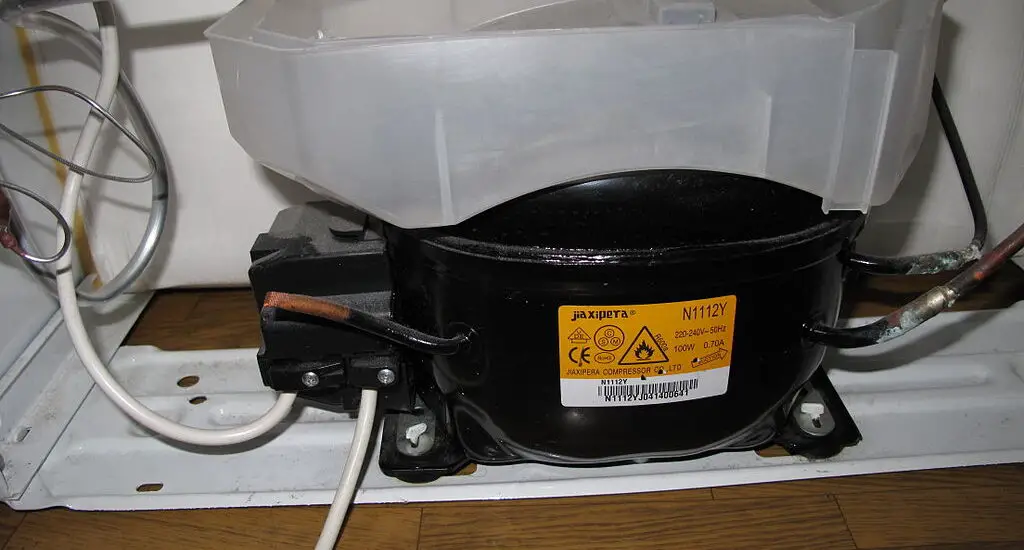Is your refrigerator compressor cycling on and off? Before you send it to the dump, let’s show you what might cause this issue and how to fix it.

Table of Contents
Overview: Why Your Refrigerator Compressor Might Be Cycling On and Off
Ever had your peaceful kitchen moment interrupted by your refrigerator’s constant start-and-stop performance? That’s your refrigerator compressor cycling on and off, a phenomenon that can signal a call for your attention. This could impact the unit’s efficiency and lead to more serious problems down the line.
Quick Answer: Main Causes of Refrigerator Compressor Cycling On and Off
Hold your horses, you might think your fridge has kicked the bucket, but the usual culprits are more straightforward. More often than not, it’s due to issues with the thermostat, a faulty start capacitor, or even an overstuffed fridge. But don’t worry, we’ve got you covered!
Detailed Analysis: Understanding the Function of a Refrigerator Compressor
The compressor is the heart of your refrigerator, pumping refrigerant through the unit and keeping your leftovers fresh and your drinks chilled. It’s the superstar in the intricate dance that is the refrigeration cycle.
Importance of Compressor in Refrigeration Cycle
Imagine trying to do a ballet without a prima ballerina. That’s your fridge trying to cool without its compressor. It’s the component that initiates the refrigeration cycle, pressurizing the refrigerant, and causing it to release its cooling charm.
How the Compressor Operates Normally
Just like your heart has a steady rhythm, a healthy compressor has its own rhythm too. It typically runs a consistent cycle, staying on long enough to maintain the desired temperature, and then taking a break until the temperature rises again.
Identifying Issues: Common Causes of Refrigerator Compressor Cycling On and Off
But what if the beat is off? If your compressor is starting and stopping more than a nervous teenager on a driving test, you’ve got a problem. Let’s take a look at some of the common causes.
Thermostat Problems
Like a conductor guiding an orchestra, the thermostat directs the compressor. But if it’s not reading the temperature correctly, it can start sending the wrong signals, causing the compressor to cycle erratically.
Signs of Thermostat Problems
Your fridge feels like the Arctic or the Sahara? Your food spoiling more quickly than usual? These could be signs that your thermostat is acting up.
Faulty Start Capacitor
The start capacitor is like the espresso shot for your compressor. It gives it the jolt of energy needed to start up. But if it’s faulty, it might give too weak a jolt or none at all, causing the compressor to start and stop.
Diagnosing a Faulty Start Capacitor
Does your fridge start but can’t seem to keep running? Does the compressor make a humming or clicking noise? These could indicate a faulty start capacitor. But please, always remember safety first before poking around electrical components!
Overfilled Refrigerator
Got a fridge stuffed fuller than a Thanksgiving turkey? That could be your problem right there. An overstuffed fridge can hinder proper airflow and cause the compressor to work overtime.
Optimal Refrigerator Filling for Efficient Compressor Function
Think of your fridge as a city. The air needs to flow freely like traffic on the streets. If it’s congested, everything grinds to a halt. Try to keep your fridge ¾ full for optimal performance.
Check out these other related articles…
Refrigerator Compressor Noise When Starting: 3 Sure Fixes
Compressor Short Cycling: 6 Proven Solutions
New Refrigerator Compressor Noise: 3 Causes and Proven Fixes
How to Quiet a Noisy Refrigerator Compressor in 4 Easy Steps
What Does a Bad Refrigerator Compressor Sound Like?
Can Power Surge Damage Refrigerator Compressor? [Answered]
Refrigerator Compressor High-Pitched Noise: 3 Proven Fixes
Solutions: How to Address Refrigerator Compressor Cycling On and Off
Now that we know the potential problems, how do we solve them? It might be as simple as adjusting your thermostat or clearing out some space in your fridge. Or it might need a bit more TLC.
Thermostat Adjustment or Replacement
Start by checking your thermostat settings. If that doesn’t work, it might need replacing. Remember, this is the control tower of your refrigerator, so it’s crucial to its performance.
Replacing a Faulty Start Capacitor
If the start capacitor is the issue, you might need to roll up your sleeves or call in a pro. If you’re comfortable with a bit of DIY, you can replace it yourself, but please, remember the safety rules!
Proper Refrigerator Loading Practices
Now for the easy part. Time to declutter your fridge. Remember the city analogy? Let’s clear the traffic jam and let your fridge breathe.
When to Call a Professional: Understanding the Limits of DIY Fixes
Okay, so you’ve tried all the above, and your fridge is still acting up. Or maybe you’re just not comfortable tinkering with your fridge. That’s okay, sometimes it’s better to call in the cavalry.
Recognizing Complex Compressor Issues
Unusual noises? Fridge not cooling at all? These could be signs that the issue is more serious, and it might be time to call a professional.
Finding a Trusted Professional
Now, how do you find a trustworthy technician? Check reviews, ask friends, and do your research. A good technician is worth their weight in gold. They can get your fridge back up and running, and save you the cost of a new one.